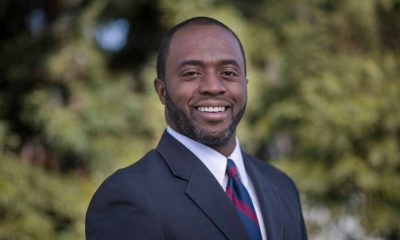Education
Popular College Choice for Black Students Survives Lawmaker’s Shutdown Attempt
Although, Calbright survived this year’s Legislative attempt to close it, those who oppose it have not given up. They emphasize that Calbright leaders must deliver on its mission on the timetable provided in the audit report and meet the milestones the Legislature established when the college was created.

When the California Legislature passed the state’s 2021-2022 budget last month, lawmakers voted to defund Calbright College, the only statewide college that is completely digital.
However, after negotiations with Gov. Gavin Newsom, the college’s funding has been reinstated.
But Senate Bill 129, the budget trailer bill Newsom signed on July 12, contains language saying that any legislation passed that eliminates the college would be binding.
Calbright College is California’s 115th community college and it is currently tuition free.
The idea for a community college offering only online programs statewide was the brainchild of former Gov. Edmund G. (Jerry) Brown Jr.
He believed increasing online course availability would make college more accessible and affordable for working adults. He envisioned it as another public option for Californians between ages 25 and 34 that would help them improve their work skills and allow them to earn certifications to move into better-paying jobs not requiring a college degree.
African American students are overrepresented in Calbright’s student body. About 23% of its students are Black. At traditional community colleges in the state, African Americans represent just 5.9% of students.
Black students are also overrepresented in the state’s for-profit institutions, where they are 18% of students. These institutions can cost up to nine times more per unit than a community college. Students incur higher debt and student loan default rates are higher. Course completion rates for students across these institutions are some of the lowest.
When the Legislature passed the California Online Community College Act in 2018, Calbright was given seven years — from July 2018 through June 2025 — to build a portfolio of programs and support infrastructure for adult students seeking to improve their job and financial status. The Act appropriated $100 million in state funds for startup costs, and initially about $20 million annually was allocated for operating expenses.
Currently, Calbright offers four programs at no cost to California residents – Customer Relationship Management (CRM) Platform Administration (Sales Force Administrator), Information Technology Support (A+), Cyber security (Security+), and Medical Coding for Professional Services.
These are competency-based education programs that are self-paced and not constrained by academic calendars like traditional community colleges. Upon completion, students can take an industry recognized exam for a Certificate of Competency that would qualify them for jobs in their field of study.
To Calbright’s supporters, including Brown, Newsom, California Community Colleges (CCC) Chancellor Eloy Ortiz Oakley and the California Community Colleges Board of Governors, the college has the potential to become the public solution to costly, predatory for-profit institutions that target adults and low-income workers and saddles them with excessive student loan debt
Since its inception, Calbright has had detracters. Much of its opposition comes from the community college faculty union. Critics, including many Legislators argue that Calbright programs are duplicative of those offered at traditional community colleges and that the millions of dollars allocated to it would be better used by the state’s underfunded community colleges.
Although Calbright began offering programs in October 2019, by February 2020 its critics requested a legislative audit to assess its progress toward creating online programs, enrolling students, building relationships with employers and collaborating with other community colleges.
The results of the audit, which cost the state over $300,000, were published in May 2021. In the letter accompanying the Calbright audit report, California State Auditor Elaine Howle revealed “It is behind in accomplishing key milestones and must act quickly to demonstrate its ability to achieve its mission.”
She explained, “A primary reason why Calbright’s progress is not on track is that its former executive team failed to develop and execute effective strategies for launching the college.”
Howle also said many Calbright executives left during its first year due to leadership failures.
“Calbright has struggled to adequately enroll the students it was intended to serve, took longer than it should have to develop a student support system, and did not adequately partner with employers in the development of its educational programs,” she added.
But, the audit also pointed out that Calbright’s new leadership has initiated actions to address the deficiencies that were uncovered.
Currently, Calbright offers African American students a tuition-free alternative for gaining new job skills certificates. Unlike students taking courses at for-profit colleges, Calbright students who are unsuccessful in gaining sought-after credentials are not severely financially penalized.
Calbright’s critics have pushed back on Howle’s assessment that “Calbright’s potential value to the State is significant.” They also have failed to acknowledge that their most repeated complaint against the college is disputed in the audit’s finding that “Calbright’s pathways are not duplicative when compared to the other programs we reviewed.”
In February 2021, before the legislative audit report was released, Assembly Bill 1432, an act to make Calbright inoperative at the end of the 2022-23 academic year, was introduced by Assemblymember Evan Low (D-Silicon Valley) and co-authored by Assemblymember Jose Medina (D-Riverside).
On May 6, before the audit report was published, the Assembly passed AB 1432 by unanimous vote (71-0). The bill was sent to the Senate for approval, but the Senate Education Committee decided not to hear it at its July 14 meeting. That killed any chance for the bill to be enacted this year.
No comment was provided by Committee Chair Senator Connie M. Leyva (D – Chino) when California Black Media reached out to find out why the bill was not heard.
According to the budget deal that Newsom accepted, if AB 1432 had been approved by the Senate, Calbright would be closed.
Although, Calbright survived this year’s Legislative attempt to close it, those who oppose it have not given up. They emphasize that Calbright leaders must deliver on its mission on the timetable provided in the audit report and meet the milestones the Legislature established when the college was created.
“We need to see substantial progress for Calbright to earn our trust and show that this has not been a wasteful experiment coming at California taxpayers’ expense,” Low says.
Activism
S.F. Black Leaders Rally to Protest, Discuss ‘Epidemic’ of Racial Slurs Against Black Students in SF Public School System
Parents at the meeting spoke of their children as no longer feeling safe in school because of bullying and discrimination. Parents also said that reported incidents such as racial slurs and intimidation are not dealt with to their satisfaction and feel ignored.

By Carla Thomas
San Francisco’s Third Baptist Church hosted a rally and meeting Sunday to discuss hatred toward African American students of the San Francisco Unified School District (SFUSD).
Rev. Amos C. Brown, president of the San Francisco NAACP and pastor of Third Baptist Church, along with leadership from local civil rights groups, the city’s faith-based community and Black community leadership convened at the church.
“There has been an epidemic of racial slurs and mistreatment of Black children in our public schools in the city,” said Brown. “This will not be tolerated.”
According to civil rights advocate Mattie Scott, students from elementary to high school have reported an extraordinary amount of racial slurs directed at them.
“There is a surge of overt racism in the schools, and our children should not be subjected to this,” said Scott. “Students are in school to learn, develop, and grow, not be hated on,” said Scott. “The parents of the children feel they have not received the support necessary to protect their children.”
Attendees were briefed last Friday in a meeting with SFUSD Superintendent Dr. Matt Wayne.
SFUSD states that their policies protect children and they are not at liberty to publicly discuss the issues to protect the children’s privacy.
Parents at the meeting spoke of their children as no longer feeling safe in school because of bullying and discrimination. Parents also said that reported incidents such as racial slurs and intimidation are not dealt with to their satisfaction and feel ignored.
Some parents said they have removed their students from school while other parents and community leaders called on the removal of the SFUSD superintendent, the firing of certain school principals and the need for more supportive school board members.
Community advocates discussed boycotting the schools and creating Freedom Schools led by Black leaders and educators, reassuring parents that their child’s wellbeing and education are the highest priority and youth are not to be disrupted by racism or policies that don’t support them.
Virginia Marshall, chair of the San Francisco NAACP’s education committee, offered encouragement to the parents and students in attendance while also announcing an upcoming May 14 school board meeting to demand accountability over their mistreatment.
“I’m urging anyone that cares about our students to pack the May 14 school board meeting,” said Marshall.
This resource was supported in whole or in part by funding provided by the State of California, administered by the California State Library via California Black Media as part of the Stop the Hate Program. The program is supported by partnership with California Department of Social Services and the California Commission on Asian and Pacific Islander American Affairs as part of the Stop the Hate program. To report a hate incident or hate crime and get support, go to CA vs Hate.
Community
ELITE Charter School Conducts Sit-In Protest at Vallejo City Hall After City Council Vote
ELITE Public School staff and students staged a sit-in at Vallejo City Hall on Wednesday afternoon to protest the City Council’s decision to vote against their Major Use Permit to expand into downtown. “We are deeply troubled by the turnover of the 6-1 vote, which we believe to be red-lining in 2024,” said Dr. Ramona Bishop, CEO of ELITE Public Schools.

By Magaly Muñoz
ELITE Public School staff and students staged a sit-in at Vallejo City Hall on Wednesday afternoon to protest the City Council’s decision to vote against their Major Use Permit to expand into downtown.
“We are deeply troubled by the turnover of the 6-1 vote, which we believe to be red-lining in 2024,” said Dr. Ramona Bishop, CEO of ELITE Public Schools. “We have followed all the requirements set forth for approval by the city and are dismayed by this sudden reversal of fortune. Our sit-in at City Hall is a testament to our unwavering commitment to justice and fairness.”
The sit-in was triggered after the Vallejo City Council members held a lengthy, special meeting on Tuesday evening to continue discussing the April 23 appeal that was made against the Planning Commission’s decision to grant ELITE a permit for expanding their charter high school into a retrofitted building in the heart of downtown.
During the deliberations, various options were presented to the Council for approving the project. These included a provisionary review period for the permit and imposing extensive conditions, such as limiting student enrollment.
The ELITE plan was to accommodate a maximum capacity of 400 students at their proposed school site, starting with an initial rollout capacity of 200 students in the first year.
Bishop rejected the suggestion by the City Council for a smaller charter capacity because the funding for the school was based on the projected number of students they would eventually seat.
During the meeting, council members complained about the lack of availability of economic impact reports that assessed the school’s potential impact on Vallejo’s downtown area.
Economic Development Director Michael Nimon sent a letter to the City Council, stating that while there was no official report, schools serve as economic generators to the surrounding areas of where they’re located.
“Schools also diversify uses and create pedestrian activity by bringing more people to downtown. Diversification of uses makes local economy more resilient by balancing residential, commercial, office, entertainment, and institutional uses,” Nimon’s letter said.
The letter also states that foot traffic is needed in an area of Vallejo that currently has minimal activity and the presence of the proposed school will likely not disturb any future developments.
Despite this, the council dismissed the letter as “merely an opinion” and not anything based on fact or concrete data.
Councilmember Peter Bregenzer, who remained silent throughout most of the seven-hour discussion, ultimately motioned for City staff to draft a resolution to approve the appeal and deny the project. The motion passed by a 4-3 vote.
About 50 students gathered on the second floor of the City Hall building where they chanted “Say it loud, say it clear, we don’t want no racists here” and “Where is the mayor? Bring him out, bring him out.”
The proposed high school has sparked intense debate, with many speculating that those opposed to the school are saying no to the expansion because the majority of the students are Black and Brown.
Retired Solano County Judge Paul Beeman and his wife, Donna, who filed the appeal against the school, have consistently denied that their opposition stems from racism or personal feelings toward anyone associated with the school.
In interviews with the Post, the Beemans seem to regard the proposed high school as a “nuisance” and an ill-advised choice for downtown development. They claim that it would be ineffective in economically revitalizing the community. However, they have provided no substantial evidence to support their opinions.
In contrast, ELITE has drawn parallels to redlining in relation to the community’s opposition to the proposed school location. Redlining refers to the discriminatory practice in which mortgage companies and other financial services systematically withhold loans and access to predominantly white neighborhoods from racial and ethnic minorities, particularly Black and African American communities.
“We’ve been fighting for this school for two years. We’re going to make our emergency, their emergency,” one student said in reference to Vallejo Mayor Robert McConnell’s previous comments about not rushing to make a decision on the school permit.
Within two hours of the start of the sit-in at City Hall, the City of Vallejo issued a statement that the building would be closed for the rest of the day because of the protest. The statement said that the loud noise from the protesters “hindered staff and visitors’ ability to conduct regular business.”
Although the mayor was not present at City Hall on Wednesday afternoon, interim City Manager Beverli Marshall addressed the ELITE group to answer several questions the students had. She explained the appeal process, how the different city officials played a role in the decision, and what the possible outcomes could be after the Council makes its final decision in a few weeks.
Students and staff were ultimately upset that they were being treated like criminals and that all their work over the last two years might be in vain since they believed that the Council had zero intention of ever granting them the permit in the first place.
The City Council is scheduled to meet for another special meeting on June 4 at 7 p.m. to continue discussing the future of ELITE Public Schools.
Community
Salesian Coach Knew Angel Jackson Could Play in WNBA
Back in 2019, Salesian Girls Basketball Head Coach Stephen Pezzola made a bold prediction about one of his players, Angel Jackson. “If she keeps putting in the work like she did for us, she could be in the WNBA,” the coach said. That turned out to be very true. Last month, the Las Vegas Aces selected Jackson with the 36th overall pick in the 2024 WNBA Draft. She is the second player from an Historically Black College or University, or HCBU, to be selected in the draft in 20 years.

The Richmond Standard
Back in 2019, Salesian Girls Basketball Head Coach Stephen Pezzola made a bold prediction about one of his players, Angel Jackson.
“If she keeps putting in the work like she did for us, she could be in the WNBA,” the coach said.
That turned out to be very true. Last month, the Las Vegas Aces selected Jackson with the 36th overall pick in the 2024 WNBA Draft. She is the second player from an Historically Black College or University, or HCBU, to be selected in the draft in 20 years.
Jackson’s success came as little surprise to Pezzola, who last year led the Pride to their 8th North Coast Section championship since he took over the program in 2008-2009. In 2019, Pezzola commended Jackson as “a very coachable kid” from the time she arrived at Salesian.
Tomekia Reed, her coach at Jackson State, shared similar sentiments, noting Jackson worked “very hard” to reach this moment.
“She came into our program doing great things and never looked back,” Reed told the Clarion Ledger. “She has trusted our leadership as we were able to develop her into an amazing player. I have watched her improve tremendously over the years.”
The 6’-6” Jackson played three seasons at the University of Southern California before transferring to Jackson State. She was ranked 10th in the NCAA in blocked shots and averaged 10 points per game in her final college season.
She finished her collegiate career with 1,047 points and was twice named Southwestern Athletic Conference Defensive Player of the Year.
As the 36th pick, Jackson was the final pick in the 2024 NBA Draft. In a television interview, Jackson said she didn’t expect to be picked, and called the moment “surreal.”
“It made me feel so appreciative that HBCU is getting back on the map again,” she said.
All she could do in that moment was cry.
“I called my mom immediately, and she started crying,” Jackson said. “It was the best moment you can feel as a young lady.”
There’s no stopping Jackson now. “The sky is the limit,” she said.
Her high school coach agrees.
“I knew that Angel could do it,” Coach Pezzola told the Richmond Standard this week. “We are so proud of Angel and what she has accomplished. It was an honor and joy to coach Angel at Salesian.”
-

 Community3 weeks ago
Community3 weeks agoFinancial Assistance Bill for Descendants of Enslaved Persons to Help Them Purchase, Own, or Maintain a Home
-

 Business3 weeks ago
Business3 weeks agoV.P. Kamala Harris: Americans With Criminal Records Will Soon Be Eligible for SBA Loans
-

 Activism4 weeks ago
Activism4 weeks agoOakland Post: Week of April 10 – 16, 2024
-

 Community3 weeks ago
Community3 weeks agoAG Bonta Says Oakland School Leaders Should Comply with State Laws to Avoid ‘Disparate Harm’ When Closing or Merging Schools
-

 Activism2 weeks ago
Activism2 weeks agoOakland Post: Week of April 24 – 30, 2024
-

 City Government3 days ago
City Government3 days agoCourt Throws Out Law That Allowed Californians to Build Duplexes, Triplexes and RDUs on Their Properties
-

 Community2 weeks ago
Community2 weeks agoRichmond Nonprofit Helps Ex-Felons Get Back on Their Feet
-

 Community2 weeks ago
Community2 weeks agoOakland WNBA Player to be Inducted Into Hall of Fame






















































